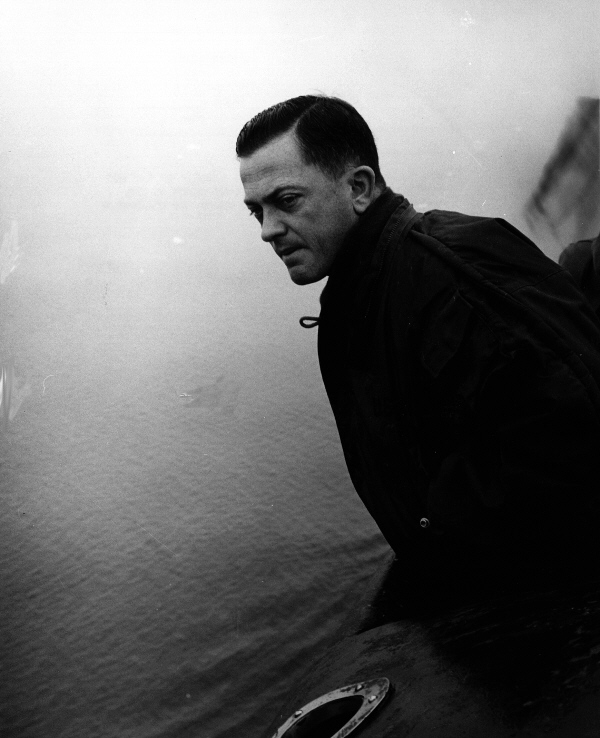- William Anderson (naval officer)
Infobox Congressman
honorific-prefix =
name =William R. Anderson
honorific-suffix =

imagesize =150px
state =Tennessee
district =6th
term_start =January 3 ,1965
term_end =January 3 ,1973
preceded =Ross Bass
succeeded =Robin Beard
birth_date =birth date|1921|6|17
birth_place =Bakerville,Tennessee
death_date =death date and age|2007|2|25|1921|6|17
death_place =Leesburg,Virginia
nationality = flagicon|USA American
party =Democratic
spouse =Patricia Anderson
relations =
children =
residence =
alma_mater =United States Naval Academy
occupation =
profession =
religion =
website =
footnotes =William Robert Anderson (
June 17 1921 –February 25 2007 ) was an officer in theUnited States Navy , and a U.S. Representative fromTennessee from 1965 to 1973.Early life and naval career
Anderson was born in
Humphreys County, Tennessee in the rural community of Bakerville, south of Waverly. He graduated from the former Columbia Military Academy in Columbia, TN in 1938, and from theUnited States Naval Academy in 1942.Anderson's service in
World War II was distinguished. He was awarded the Bronze Star and several other combat decorations from participation in a total of eleven combatsubmarine patrols. He was selected byAdmiral Hyman G. Rickover to be the second skipper of the first working nuclear submarine to be placed into service, the USS "Nautilus", and was its commander from 1957 to 1959. Anderson and his crew received international notice when the "Nautilus" became the first submarine to sail successfully under the polar ice cap surrounding theNorth Pole .That transit was completed under direct orders of President
Dwight D. Eisenhower and under extreme secrecy and was in direct response to the launch of theSputnik satellite by the Russians. The president felt such a display of technological and military capability would offset the advantage won by the Soviets with Sputnik. The voyage by Anderson and his crew led the way for other submarine exploration beneath the ice cap and gave a decided military advantage to the U.S. Anderson received theLegion of Merit from President Eisenhower for leading his crew and ship on this historic mission.Author
He wrote a 1959 book about his journey under the North Pole, "Nautilus 90 North", co-written with Clay Blair Jr. [Published by Hodder and Stoughton. ISBN 0830640053.] An updated and more complete book about the North Pole transit, "The Ice Diaries," [Published by Thomas Nelson Publishers, July 2008. ISBN 0785227598.] with co-author Don Keith, was completed just before Anderson's death. The book features previously classified information and many details not available for the first book.
Political career
Upon retiring from the Navy, Anderson entered politics. He mounted an independent campaign for
governor of Tennessee in 1962, finishing second to former Democratic governorFrank G. Clement . While the race was not particularly close, he made several important political contacts and provided Clement with his main competition outside of the Republican stronghold ofEast Tennessee .In 1964 Anderson entered the Democratic primary to replace Sixth District Congressman
Ross Bass , who was running for theUnited States Senate to finish the term of the lateEstes Kefauver , and won both the nomination and the subsequentgeneral election . (Fellow retired naval officerGeorge W. Grider was elected to the Ninth District seat, in the Memphis area, on the same day.) Anderson was reelected three times. He only received less than 70 percent of the vote in 1968, whenRichard Nixon won the state.Anderson proved to be somewhat more liberal than expected for a naval veteran representing a largely rural district in western and central Tennessee. In fact, in the Tennessee congressional delegation of that time, only
Richard Fulton of the neighboring 5th District (Nashville) had a more liberal voting record. Anderson was well-regarded in some Democratic circles and was sometimes mentioned as potentially having a bright future, with some even suggesting him as a potential vice presidential nominee in 1972 based largely upon his military record.However, Anderson's independent gubernatorial race and his progressive tendencies had not been forgotten by many of his fellow Democrats, particularly in the General Assembly. Tennessee was slated to lose a congressional district as a result of
reapportionment following the 1970 census, and Anderson's district was considerably reconfigured prior to the 1972 elections. Anderson's district received a large area around Memphis where Republican influence was strong and growing, while simultaneously losing some solidly Democratic areas.Observers felt that if there was a vulnerable Democratic incumbent in the Tennessee congressional delegation in 1972, it was probably Anderson. This came to pass in the gigantic Republican landslide of 1972, in which President Nixon carried 49 of 50 states and 90 of Tennessee's 95 counties, and Anderson lost to Republican state personnel commissioner
Robin Beard by 12 points. Since then, the district—renumbered the Seventh District in 1983 —has become the state's most Republican region outside of East Tennessee, and Democrats have only made three serious bids for the seat.Anderson retired from public life. He served as an officer with the Public Office Corporation, and lived in
Alexandria, Virginia . He died onFebruary 25 2007 , after living inLeesburg, Virginia during the final years of his life.ee also
References
External links
*CongBio|A000203
* [http://www.nytimes.com/2007/03/06/obituaries/06anderson.html?_r=1&ref=obituaries&oref=slogin Obituary] , "New York Times ",March 6 ,2007
* [http://www.guardian.co.uk/obituaries/story/0,,2028106,00.html Obituary] , "The Guardian ",7 March 2007
Wikimedia Foundation. 2010.
